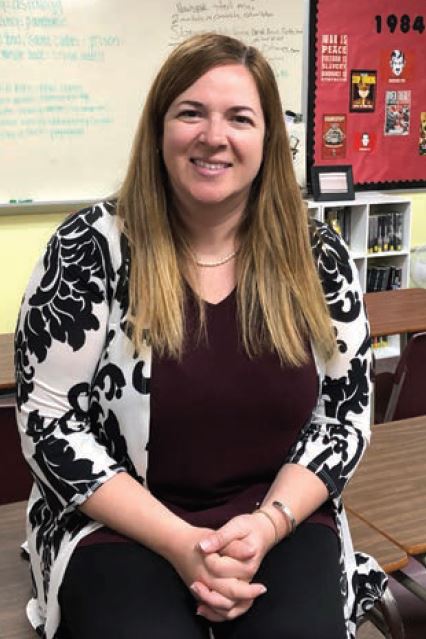MEMBER SPOTLIGHT: Veteran educator’s journey through pandemic bookended by losses
For MEA member Sandy Safford-Groff, the last two years have been especially hard – both as an 18-year English teacher in Cheboygan and a human being.

Early in the pandemic Safford-Groff lost her mother, Dale Safford – a retired school librarian in Iron River, the small Upper Peninsula town where she grew up loving books – soon after a cancer diagnosis. After care-giving, the newly married educator was executor of her mother’s will in the disorienting early days of COVID.
Then this past May, Safford-Groff lost a close uncle, Sim Safford, also an educator. In between those two painful book-ends, she transformed her teaching to virtual in a rural region with sketchy internet access for one whole school year, took a job bartending amid a second year of pandemic teaching, and found ways to keep doing what matters most – building community.
She still copes with grief from her mother’s death in 2020 which got pushed off because of all she was facing at the time. “It comes in cycles that sometimes hit in bursts like a storm.”
Last November she took a job working at a restaurant in Mackinaw City, 15 miles from home, for many reasons, including the one driving many educators out of the profession—stress from teaching amid a pandemic.
“I think for most teachers it was the same – the loss of connections and relationships with kids was really hard when we had the big shutdown,” said Safford-Groff, who has 12 family members on the Safford side who either are or once were teachers.
Other reasons for the second job: she and her husband – married in August 2019 – own a house that needs some work, and she had stepped down from coaching high school track, though she still manages boys’ and girls’ cross country for what will be her ninth season coming up.
Plus she’s a high-energy extrovert who wanted a part-time job with adult interaction that she could leave and not worry about later.
 “I love listening to people talk about vacations and their lives, and I love this area, I love the island,” Safford-Groff said of working at The White Buffalo Bar and Grille up the street from the ferry dock for visitors to Mackinac Island.
“I love listening to people talk about vacations and their lives, and I love this area, I love the island,” Safford-Groff said of working at The White Buffalo Bar and Grille up the street from the ferry dock for visitors to Mackinac Island.
On the night we met for the first time, she wore Icy Hot balm on a foot she had tweaked that morning during a faculty-student dance-freeze competition in a school pep assembly. The next day she admitted to crashing in bed as soon as she got home from that shift around 10:30 p.m.
Named the 2015 Teacher of the Year by the Michigan Council of Teachers of English, Safford-Groff learned to tend bar many years ago at another Mackinaw City hangout – the Dixie Saloon – using her money to build a classroom library of more than 500 books to help her students find their love of reading.
She’s the type of educator who enjoys bringing relevance to 1984 and showing the Power of One via The Crucible, the kind of teacher students bring their problems and thanks. She worries about staffing shortages and the future of the profession, so she mentors beginning teachers as she was once nurtured.
“I think we should all be concerned, but I see lights in the darkness too,” she said. “I still see teachers joining the profession – great people who know it’s right for them and are trying to find their niche even though they know the job is intense.”
Seeing students share stories at her uncle’s funeral in Wisconsin reinforced long-held beliefs. He was known for his humor as a sports announcer and in school hallways, even with students not in his class.
“It was phenomenal to see my uncle’s impact, and it made me even more so want to maintain connections with kids beyond just when they’re in my room, because that’s what it’s all about—building community is how they find goodness and what matters.”



